MercoPress. South Atlantic News Agency
Tag: Eurozone
-
Tuesday, December 12th 2023 - 10:59 UTC
Macri favors Mercosur single currency

Former Argentine President Mauricio Macri said in Brazil he supported the idea of a single currency for all Mercosur countries because if the bloc was “serious” it needed “the same rules and the same currency, like the eurozone.”
-
Friday, September 9th 2022 - 07:53 UTC
Euro zone adopts an aggressive rates policy: “inflation remains too high and is likely to stay”
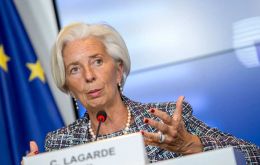
The European Central Bank decided on Thursday to increase the three key interest rates by 75 basis points, making a dramatic change from the prevailing transition accommodative rates' levels to ensure a timely return to the ECB's inflation target of 2%.
-
Thursday, July 14th 2022 - 09:10 UTC
Ukraine war: Euro cheaper than the US dollar for the first time in two decades
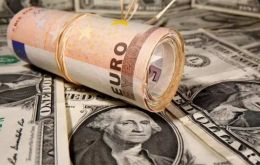
As Ukraine war continues and fears that Russia could further restrict Europe's supplies of gas, increasing the chances of a recession in the Eurozone, the European common currency has fallen below the dollar for the first time in nearly 20 years.
-
Friday, July 10th 2020 - 08:06 UTC
Irish minister elected new president of the Eurozone finance group
![“As I begin my tenure as president of the Eurogroup, I'm deeply conscious that the citizens of Europe...have become fearful again for their [futures],” Donohoe said](/data/cache/noticias/76952/260x165/paschal-donohoe.jpg)
Ireland's finance minister Paschal Donohoe has been elected as the new president of the eurozone's finance group. Donohoe succeeds former president Mário Centeno from Portugal who said in June he would not run for another term as Eurogroup president.
-
Thursday, June 11th 2020 - 13:28 UTC
Spain eyeing chair of the Eurozone of finance ministers and WTO leadership
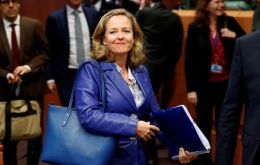
The Spanish government started lobbying on Wednesday for Economy Minister Nadia Calvino to take the presidency of the Euro-group, with a minister saying “it would be good news” if she were to replace Mario Centeno, who is stepping down.
-
Monday, March 16th 2020 - 11:19 UTC
G7 global rescue: Fed cuts rates to almost zero and launches US$ 700bn stimulus program
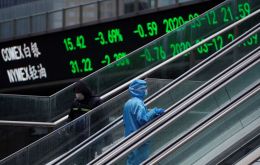
The US has cut interest rates to almost zero and launched a US$ 700bn stimulus program in a bid to protect the economy from the effect of coronavirus. It is part of a coordinated action announced on Sunday in the UK, Japan, the Eurozone, Canada, and Switzerland.
-
Thursday, October 31st 2019 - 08:51 UTC
New ECB chief calls on budget surplus countries to spend more and help prop growth

Incoming European Central Bank chief Christine Lagarde on Wednesday took aim at Germany and other thrifty Eurozone members running budgetary surpluses, saying they should increase their spending to shore up slowing growth.
-
Friday, March 8th 2019 - 09:15 UTC
Euro zone interest rates frozen for twelve months given overall slowdown
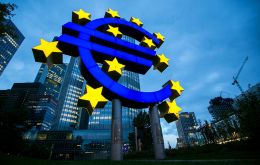
Interest rates in the Euro zone will not rise until next year at the earliest, the European Central Bank has signaled amid evidence of a slowdown in the 19 countries using the single currency. The ECB also unveiled a round of fresh stimulus, offering banks cheap loans to try to help revive the economy.
-
Friday, December 14th 2018 - 09:03 UTC
ECB confirms it's ending the massive bond-buying scheme
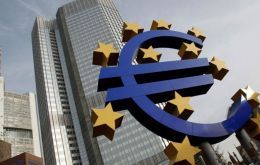
The European Central Bank has confirmed it is ending its huge net asset purchase program to stimulate the Eurozone economy this month. The ECB has stopped its bond-buying scheme, worth €30bn a month, despite a recent slowdown in the bloc's recovery.
-
Sunday, August 26th 2018 - 01:26 UTC
Central banks reviewing “phasing out cash” because of IT failures, hacking and alienation

Europe’s central bankers are warning that a gradual phase-out of cash in many countries poses a serious threat to the financial system, as relying too heavily on digital payment systems exposes them to catastrophic failures in the event of cyber attacks.
